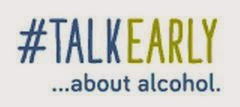
This post was sponsored by FAAR in collaboration with the Talk Early campaign, an initiative to empower parents to talk with their kids about alcohol.
We live near the beach, and a popular boardwalk takes us right down to a beautiful spot on the Pacific. Riding boardwalk path on a summer evening or weekend is one of our favorite things to do as a family. Unfortunately, it also takes us past a variety of beachside bars, which means my kids have encountered their share of drunk and disorderly conduct.
It can be a little alarming for them. As a mom, it can be alarming for me, too. We usually keep pedaling right on past, and once we do, we take advantage of that teachable moment. There’s nothing like a slobbering drunk dude on the beach to open up a conversation about the responsible use of alcohol with your kids.
When I was growing up, I didn’t have any such conversations with my parents, because alcohol was not a part of our lives at all. Due to a very conservative, religious upbringing, I never heard anything like the phrase “in moderation” applied to alcohol consumption. In my family, drinking was bad. Period. It was always wrong, and my assumption was that it always led to drunkenness. I never observed my parents drinking alcohol because they didn’t drink at all. As a result, I didn’t have any concept of responsible drinking. To be honest, I wonder if some of my later teenage rebellion may have had something to do with this.
Unlike my parents, today I don’t believe that drinking, in itself, is bad. Mark and I do drink on occasion around our kids. We took our family to a Memorial Day picnic where alcohol was served. We’ll do the same in a couple weeks for July 4th. When friends and their families come over, we may open a bottle of wine or enjoy cocktails. Our close friends like to give Mark a bottle of whiskey for his birthday or Christmas, that usually lasts until the following year. With our kids, alcohol is a visible part of our lives in the same way that, for example, sushi is a part of our lives. They know we consume it. We consume it around them. But unlike sushi, they understand alcohol is something not for kids and only for adults—especially adults who take it very seriously.
We make sure they understand this because we take advantage of those teachable moments. When my kids see a drunk person, we talk to them about it.
“Did you kids see that guy near the beach?” I might ask. “The one we steered past by the taco place?”
“You mean the funny loud guy?”
Yes, kids. The hilarious guy who was yelling and shirtless and stumbling around and who looked like he was within a few seconds of losing his swimsuit altogether. THAT guy. He’d had about eight too many margaritas.
“Why do you think he was acting that way?” I’ll ask.
“He was DRUNK!” they’ll answer.
Because they know. We talk about how alcohol can be a good part of a meal or a conversation with friends, but you have to know when to stop. You have to be very careful about drinking too much. If you drink too much, we tell them, you can get drunk.
A drunk person might be silly, like the guy at the beach. But a drunk person might also be angry, or violent, or mean. When people get drunk, they get out of control, and that’s never a good thing. They might make bad decisions. They can’t contain their impulses. They might hurt someone.
Drinking isn’t necessarily bad, we tell them. But being drunk IS often a bad thing because it leads to bad decisions and bad behavior.
So we talk and talk and talk about drinking, while we also try to model healthy moderation. Here is what alcohol does to your brain. Here is the difference between beer and wine. Here is how much alcohol is in whiskey. Here is why it’s so easy for people to drink too many margaritas. Here is why it’s OK for Mom and Dad to drink alcohol, but not OK for you guys to drink it. In our family, alcohol isn’t taboo—and it’s not unfamiliar. It’s something we talk about on a regular basis.
In fact, it’s something we’ve communicated about with the kids before I even got involved with the #talkearly campaign, just because we think talking about this stuff is so important. The easy stuff. The hard stuff. The complicated stuff. The uncomfortable and scary stuff. If our kids learn it’s comfortable to talk about these things now, then hopefully that will make it easier for them to come to us in the future, when they need us—regardless of the topic.
So we’re talking, and talking early. And we’ll keep talking as long as our kids will listen. Hopefully that will last a long, long time.
